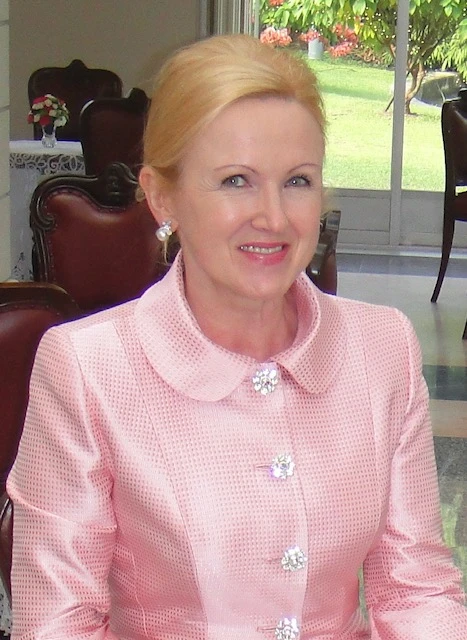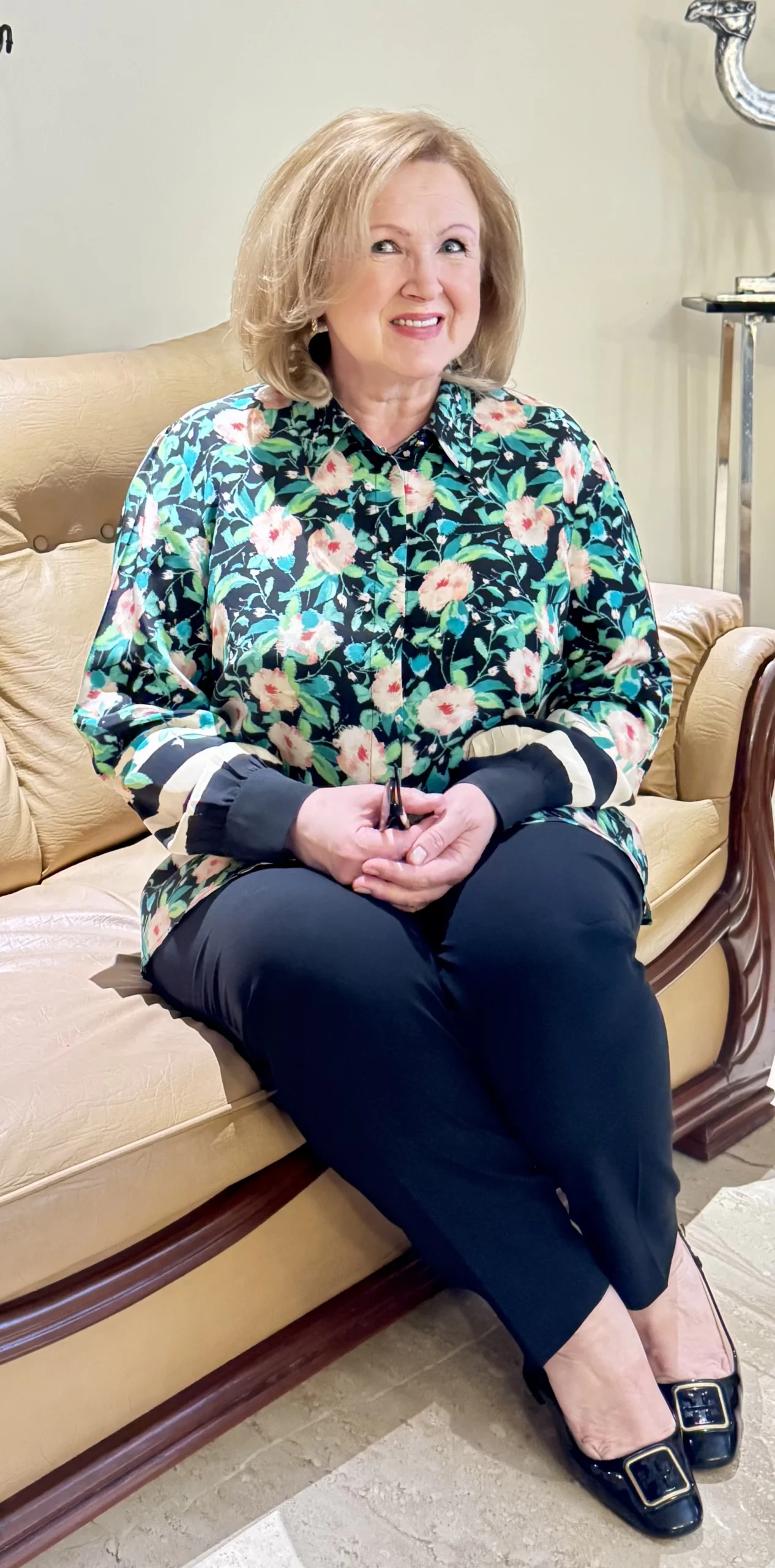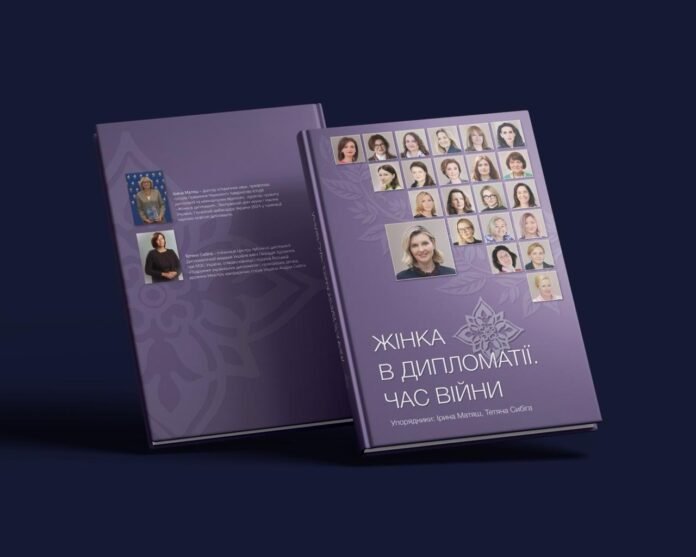For Dr. Tetiana Chuchuk, a Ukrainian physician by training and the spouse of Ukraine’s Ambassador to Pakistan, the journey from the silence of hospital wards to the vibrant world of cultural diplomacy was not a career shift—it was a calling. With a calm dignity that blends grace with resilience, she embodies the essence of a humanitarian diplomat—one whose tools may not be briefcases and policies, but poetry, compassion, and a deep cultural soul.
Q: You’re a co-author of the book “Women in Diplomacy.” What does this book mean to you?
TC: The book is a unique collection of personal stories about the work and achievements of Ukrainian women on the international stage. Their stories are beyond the diplomatic rituals and protocols — the work of women who have made significant contributions to strengthening trust between countries and peoples.
I authored an essay about my cultural and humanitarian mission in the Kingdom of Thailand and the Islamic Republic of Pakistan. Of course, it’s physically impossible to fit years of work and life into a short story. So, I focused only on some vivid moments reflecting how we introduced Ukraine to the world through the medium of culture, like exhibitions, films, poems, silk, and dances.
My essay became an integral part of the unique book “Women in Diplomacy of Ukraine”. The participation of Ukraine’s First Lady, Olena Zelenska, lends special significance to this book. Her work, especially in wartime, has become an example of a bright, innovative approach to cultural and humanitarian diplomacy, with an emphasis on education and culture.
Her projects lay the foundation for systemic work and go far beyond formal diplomatic gestures. This isn’t a verbose theory but rather a real-life practice of overcoming war-induced problems on a human level, including support and caring for mental health.
The book brings deeply personal and significant stories of women representing Ukraine to the world, especially about human dignity, female leadership, and women’s efforts to overcome global challenges.
In 2021, Madam Olena Zelenska drew global attention to the role of spouses of heads of state and diplomats. She initiated and launched the Summit of First Ladies and Gentlemen Global Platform in Kyiv in August 2021, under the theme “Soft Power in the New Reality,” as well as the Association of Spouses of Ukrainian Diplomats.

Q: What does diplomacy mean from the perspective of a woman?
TC: Diplomacy, in general, is a complex and multifaceted field aimed at defending one’s country’s national interests and developing mutually beneficial cooperation with other nations. My area of interest is primarily cultural and humanitarian diplomacy. It’s special and often requires different approaches than classical diplomacy.
In my opinion, women can bring something to diplomacy that men sometimes lack: emotional intelligence, sensitivity, and charm. Sometimes, this is more effective than political debates.
Such emotionally charged moments don’t make it into official reports, but they remain forever in the memory of interlocutors and can create a positive impression of your country and your people.
Q: What moments in your diplomatic experience have been the most memorable for you?
TC: In Pakistan, a particularly memorable moment was the ceremonial evening dedicated to the 150th anniversary of the famous Ukrainian poetess Lesya Ukrainka – it was one of the first cultural events after a long lockdown. In the quiet hall of the Academy of Letters, I recited her poem “Contra spem spero” (“Hope against hope”) by heart in English – a profound, prophetic work by the outstanding Ukrainian poetess and writer. And I saw how her words touched hearts
Another heartwarming moment was a pre-New Year’s visit to the Suffa Sweet Home orphanage with some other ambassadors’ wives, and also to the Lighthouse school. These meetings were about a simple yet profound presence. Genuine exchange of smiles, and gifts for the children that we bought with our own funds. In such moments, cultural diplomacy transforms into what it should be, a bridge between hearts.
Life is full of unexpected moments. At one event, right before my eyes, a Pakistani human rights activist collapsed without any signs of life. In that dramatic moment, I stopped being an ambassador’s wife; I became a doctor again. I had to disregard my special status because I had taken a doctor’s oath. I had to act, as a human life was on the line. I rushed to her and performed CPR. And she came back to life. It was a moment where diplomacy and humanity became one.
Q: Ukraine is currently at war. How does this affect your activities abroad?
TC: When your country is under daily shelling, your heart is always on the front line, even if you’re far away. This isn’t just another conflict that constantly arises in the world; it’s an existential battle for the existence of the Ukrainian people. I would like to emphasize: we didn’t start this war. We are fighting to defend our freedom, our families, and our land from the aggressor.
The war has made us more sensitive to human suffering and, at the same time, more direct and decisive. It has sharpened our sense of the value of truth and justice. It has revealed who our true friends are.
In the countries of the so-called Global South, talking about a war that feels distant to them is difficult. So, we use every opportunity: cultural events, exhibitions, film screenings, speeches, to convey the truth about this bloody war. I am very grateful to many Pakistanis who hear us and genuinely empathize. Their words of support, “We are with you,” carry immense power.
Q: What role does cultural and humanitarian diplomacy play in your activities?
TC: Culture is the language through which a nation speaks to the world. For me, cultural diplomacy is not an add-on to “grand politics,” but its very soul. We reveal Ukraine through poetry and cinema, through music and dance, through silk, embroidered shirts, colors, and voices. It’s a soft power that penetrates the most hidden corners of human perception.
I would like to mention the screening of the short film “Mam” by director Anna Hnatenko-Shabaldina and its inclusion as a Ukrainian film in the 2024 International Women’s Film Festival in Pakistan – an event dedicated to women’s experiences, dignity, and strength.
Also important was the screening of the film “20 Days in Mariupol” in Lahore and Islamabad. People were shocked but grateful for the opportunity to see the truth. It touched many hearts; this is the essence of cultural diplomacy.

Q: What are your impressions of Pakistan? What has your experience been like?
TC: The first landscapes I saw in Islamabad didn’t make me feel like I was in another country. It was similar to some regions of my country! The city is surrounded by breathtaking scenery: the Margalla Hills, lush greenery, and the fragrance of flowers that bloom almost all year round.
Pakistanis are incredibly warm, hospitable, and genuine. They are also remarkably driven and appreciate cultures and traditions. Pakistanis consistently show support and empathy, always greeting you with a warm smile and the question: “How are you?” – with such genuine care that needs no explanation.
Pakistan gave me a sense of closeness to nature, peace of mind, and human warmth at a time when all of that was so distant for my native Ukraine. And for that, I am deeply grateful.
Q: In your opinion, what are the similarities between Ukrainians and Pakistanis?
TC: Despite their different geography, historical context, and traditions, Ukrainians and Pakistanis have a lot in common at a deep level.
Our nations are sensitive, open-hearted, with a deep sense of dignity. We equally honor family, respect elders, and cherish traditions and hospitality. In both Ukraine and Pakistan, a guest is always welcome, almost like a family member. The Ukrainian vyshyvanka and the Pakistani shalwar kameez are not just clothes. Our cultures are distinct and vibrant. Our songs, dances, and folk literature are the roots that hold us during hard times.
We are similar in our ability to maintain inner strength even in the most difficult times. Both Ukrainians and Pakistanis have gone through tragedies, wars, and losses – but they haven’t broken.
It’s also important to note: Ukraine is a multinational and multi-confessional state, home to a significant Muslim community. The majority of them are the Crimean Tatars, one of the indigenous peoples of Ukraine. Muslims play a prominent and important role in our country. Among them, for example, is Ukraine’s Minister of Defense, Rustem Umerov.
Cultural diplomacy is not an add-on to grand politics, but its very soul
Q: What advice would you give to young women, especially Ukrainians, Pakistani women?
Believe in yourself – even when you doubt yourself. Speak about what matters. Explore, learn, don’t be afraid to ask questions. Small, but persistent and consistent steps create big changes. In diplomacy, as in life, it’s sincerity, empathy, and humanity that leave the deepest mark.







